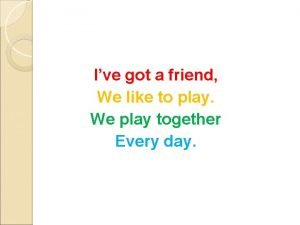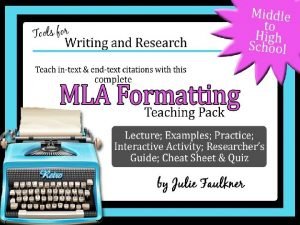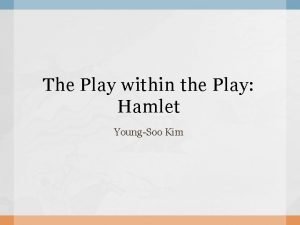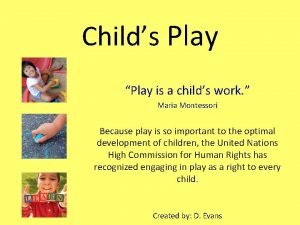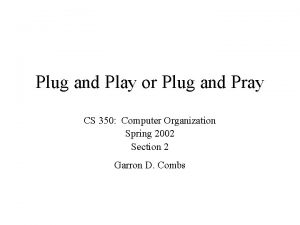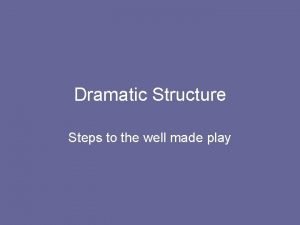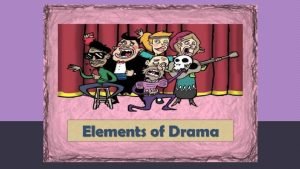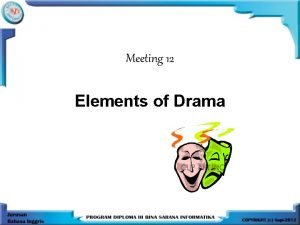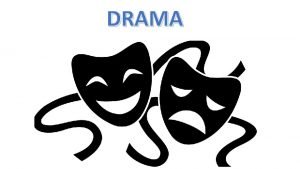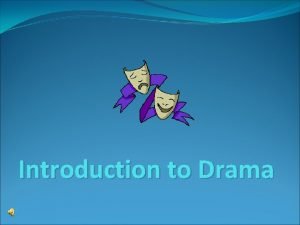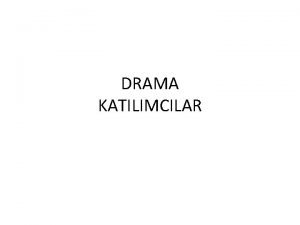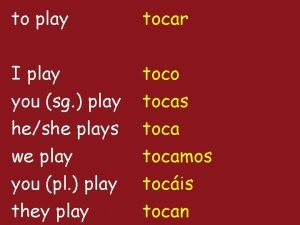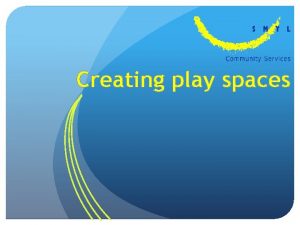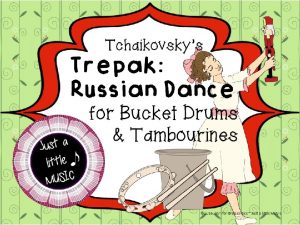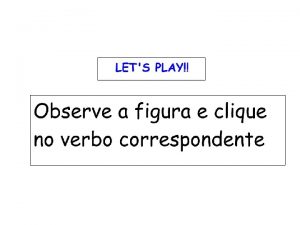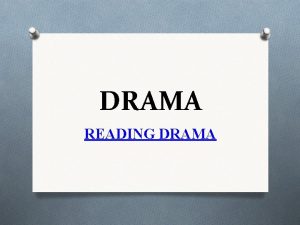Drama What is Drama Drama is work play














- Slides: 14

Drama What is Drama? Drama is work (play) meant to be performed on a stage by actors. It is the genre of literature represented by works intended for performance on stage. Usually the plays performed are highly emotional, tragic, or turbulent. Drama is the most dependent of art forms – director, director actors, actors scene and costume designers - Drama – as an art of communication – conveys life itself. -

Drama Difficulties in reading drama are connected with works being: 1 - scripts intended for performance 2 - records of actual performances - Playwrights or dramatists create plays and hand them over to actors – medium through which the play reaches the public. Plays involve human beings moving about, talking, and doing things spontaneously. - Actors must hold the audience’s attention and the play is affected by the audience’s response to it. -

Drama Playwright actors audience to be contrasted with author - reader The difference between reading a play and attending a performance is the former is a private activity and the latter is a public activity and involves diversity of response.

Fiction and Drama Fiction Drama Little action takes place – mostly consists of people’s reaction to certain events or situations. More action takes place – audience must analyze characters’ personalities and feelings through their performance on stage. Greater choice of characters. Less choice of characters. Provides insight to minds of characters through omniscient narrator (the author). Absence of omniscient narrator – hence no direct description, comments. Only first person dialogue.

Poetry and Drama Poetry Drama Less dialogue – if there is any. Play is based on dialogue Less characters. More characters. Poems are more intellectual and concerned more with meaning. Drama is less intellectual and deals more with feelings and interpretations.

Categories of Drama Tragedy: Tragedy is a kind of drama that deals with suffering, grief, and death. Tragedy stirs powerful emotions and its prevailing tone is serious. In general, tragedy involves the ruin of the leading characters. 1 - Greeks: Greeks destruction of some noble person through fate. 2 - Elizabethans: Elizabethans death and the destruction of some noble person through a flaw in his character. 3 - Modern tragedy: tragedy shows the tragedy not of the strong and noble, but of the weak and mean.

Categories of Drama Kinds of Tragedy: 1 - Greek Tragedy 2 - Senecan Tragedy 3 - Shakespearean Tragedy 4 - Heroic Tragedy 5 - Domestic Tragedy 6 - Revenge Tragedy 7 - Political Tragedy

Categories of Drama Comedy: Comedy is lighter drama and its tone varies: it can be merry, heartless, bitter-sweet, or savage. Comedy is: 1 - amusing and entertaining. 2 - may focus on serious matters and deal with them thoughtfully and provoke its audience to profound questioning. 3 - accomplish its goals through its liveliness, high spirits, wit, and humor. - There are many varieties of comedy that any play not recognizable as tragedy is classified as some kind of comedy or a combination of different kinds.

Categories of Drama Kinds of Comedy: 1 - Satiric Comedy 2 - Comedy of Intrigue 3 - Comedy of Humors 4 - Comedy of Manners 5 - Romantic Comedy 6 - Burlesque and Parody 7 - Black Comedy

Categories of Drama Tragi-comedy Farce Melodrama Chronicle play Morality play Interlude The well-made play Problem Plays Play of Ideas Epic Plays Absurdist and surrealist Drama Documentary Drama

Elements of Drama Plot: Plot - gives the play unity and identity - inferred from the characters’ actions - order of presentation of events - angle from which events are shown Action: performance Action - act + actors - changes occurring situations - general movement forwards in time

Elements of Drama Characters: Characters - most vivid and concrete element of a play - shown through attitudes, manners, and impressions - protagonist – antagonist – minor - function to fulfill in a play - the more a character contributes in a play, the richer it becomes

Elements of Drama Dialogue: Dialogue - provides material for a play - word choices made by the dramatist and accent of the actors delivering the lines - conversation between characters - presented in verse form - distinguishing feature of drama - principal medium through which dramatists communicate their dramatic ideas and sense of life

Elements of Drama Spectacle: Spectacle Themes: Themes Symbols: Symbols Images: Images - visual element of the production of a play: scenery, costumes, lighting, audio effects - idea of the play – meaning hidden behind the literal level - interpreted embodiments in a play - visual form on stage conveying an image through dialogue
 I've got a friend we like to play we play together
I've got a friend we like to play we play together Play random play basketball
Play random play basketball Play by play
Play by play Hamlet kim
Hamlet kim O my fair warrior analysis
O my fair warrior analysis Energy enables you to work and play
Energy enables you to work and play Childs work childs play
Childs work childs play Whats plug and play
Whats plug and play Work hard. have fun. make history
Work hard. have fun. make history Moro moro props and costumes
Moro moro props and costumes Well-made play
Well-made play A play that ends unhappily
A play that ends unhappily What are elements of drama
What are elements of drama Stage directions example
Stage directions example Difference between play and drama
Difference between play and drama
